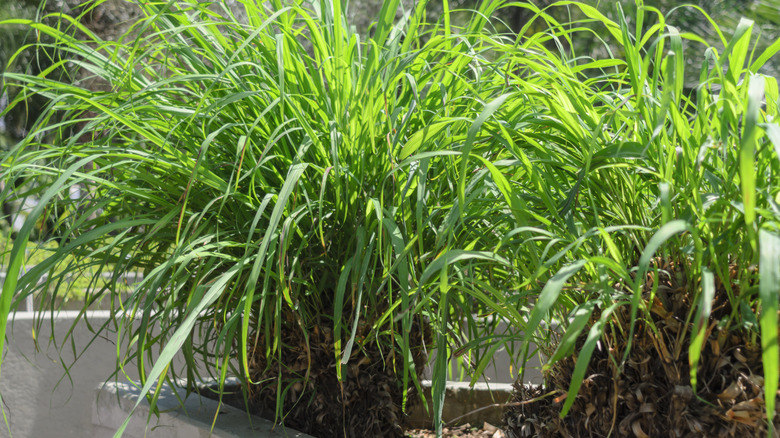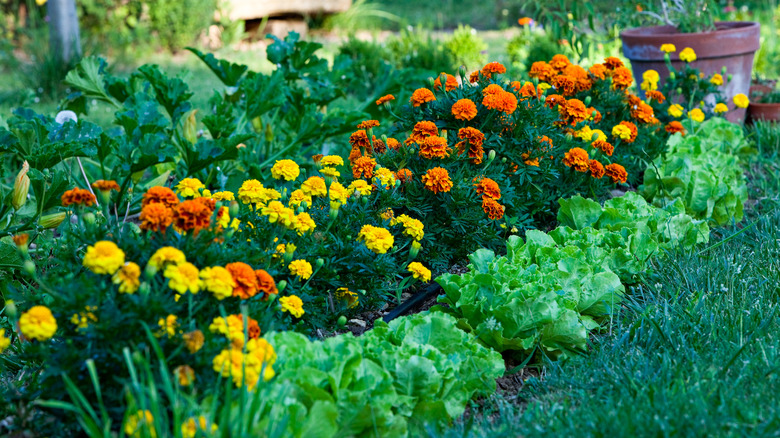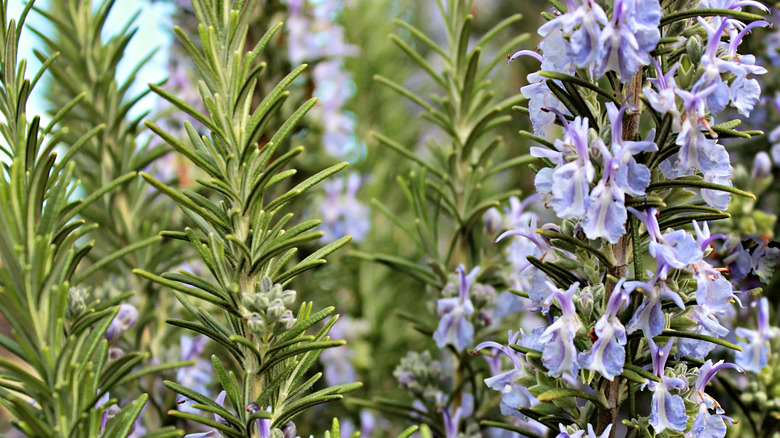Citronella Companion Plants For A Pest-Free Yard And Garden
If you live somewhere with a lot of mosquitos flying around, chances are you've heard of (or at least smelled) citronella. A variety of geranium, citronella (Cymbopogon nardus), is known for its sharp citrus scent, which is actually a result of oil produced when the plant's leaves are crushed. This oil is famous for repelling mosquitos and is often added to candles and other products for such a purpose. Fortunately, you can unlock citronella's pest-preventing powers by roughing it up every now and then. Even if you don't need to get bugs out of your yard, citronella still makes for an attractive ground plant in any garden. Whether you're trying to ban bugs or fill out the extra spaces of your garden plots, you can increase citronella's powers with companion plants like marigolds, rosemary, and lemongrass.
Companion planting is an easy and effective gardening practice. Basically, it means planting different vegetables, herbs, and flowers that can benefit each other close together. For a full explanation, check out all the ways companion planting can benefit your garden. One example of companion planting would be planting basil next to citronella since they have complementary scents that smell good to most humans but repel pests. There are many different combinations of companion plants to grow next to citronella, and each brings out different beneficial properties of this pest-repelling plant.
Citronella flourishes next to certain flowers
Citronella's vibrant green leaves make it the perfect backdrop for a number of vibrant flowers. For instance, fiery orange French marigolds (Tagetes patula) also have pest-repelling properties, making them a great companion for citronella. Aside from bugs and grubs, marigolds can also ward away four-legged pests such as deer, so the flowers can work with citronella to protect your garden from all outside interference. Lavender (Lavandula angustifolia) is another flower that grows well next to citronella. Both plants require similar conditions, like a lot of light and little water. Plus, the soothing scent of lavender isn't appealing to pesky insects. If you need more convincing, check out these other benefits of planting lavender in your lawn.
There are plenty of other flowers that thrive alongside citronella, including other species of geranium. To protect the citronella and the other plants in your garden, you can also include a few plots of nasturtium (Tropaeolum majus). These bright, edible flowers are pest magnets, so you don't have to worry about any creepy crawlies breaking through your forcefield of anti-bug flower power. Planting citronella next to companion flowers doesn't just keep your yard free of pests; since citronella is mainly shrubbery, extra blooms give it some eye-catching pops of color, too.
Herbs add extra protection from pests
A few cuttings from your herb garden can also work wonders next to citronella. To further enhance citronella's pest-repelling abilities, plant some rosemary (Salvia rosmarinus) next to it. You won't even have to make any changes to your gardening schedule since rosemary and citronella have the same needs. Catnip (Nepeta cataria) is another herb that convinces mosquitos to buzz off; simultaneously, it also attracts pollinating insects that can help your entire yard. It's important to note that citronella is toxic to pets, so if you have a cat, you should keep any enticing catnip far away from citronella. It's also considered invasive in West Virginia. If you need a different herb to draw in bees and other helpful insects, try putting in some thyme.
Perhaps the best plant to grow next to citronella is its cousin, lemongrass (Cymbopogon citratus). Both of these plants prefer sunny, humid conditions, and both are excellent choices for naturally repelling pests (specifically mosquitoes). The combination of citronella and lemongrass offers a garden design with more variation in height and color, and even their strong citrusy scents go together nicely. These two plants are somewhat interchangeable when it comes to protecting your garden from dangerous pests and providing a fresh, pleasant aroma, so while they are great as a pair, using lemongrass by itself is a valid choice if someone in your household has an aversion to citronella, especially if you need help keeping citronella alive.


